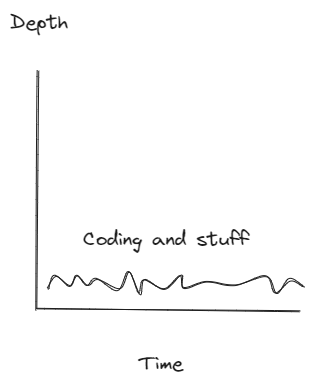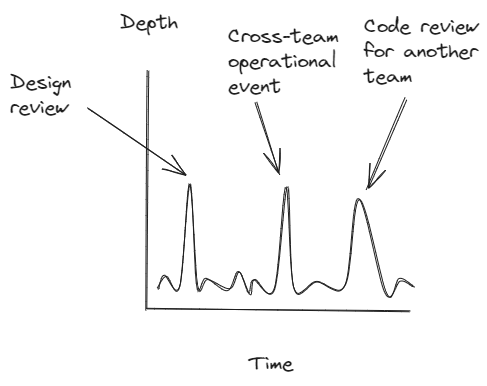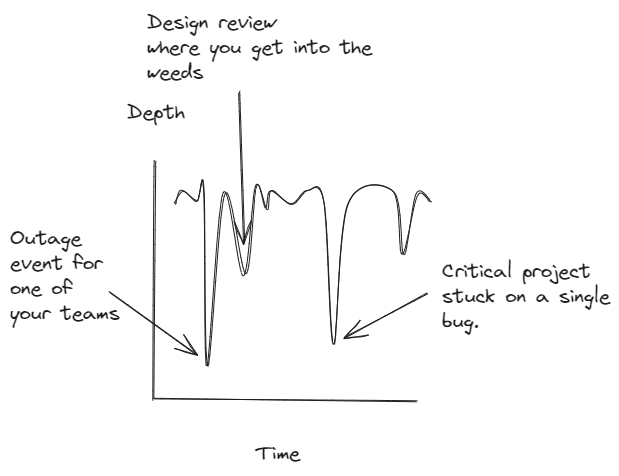Why Senior Employees Need to Audit and Verify Things for Themselves — It's Not (Only) That We Don't Trust You
As a junior employee, you learn everything firsthand. As you grow in seniority, you begin to learn things second and thirdhand. How do you audit to ensure you still get firsthand knowledge?
Welcome to the Scarlet Ink newsletter. I'm Dave Anderson, an ex-Amazon Tech Director and GM. Each week I write a newsletter article on tech industry careers, and specific leadership advice.
The engineering team was absolutely positive about the number one customer complaint for their part of the Amazon Marketplace Selling platform.
“It’s absolutely the lag on updating inventory numbers.” the team insisted. “These customers update their inventory numbers, and it’s not immediately reflected in their dashboard.”
“How are you sure that this is the biggest problem for your customers?” I asked.
“Oh, we know.” they insisted. “It’s been our biggest issue for a long time. We’re almost done fixing it. We’ve spent the last few weeks getting this resolved.”
When you get more senior, you lose track of many details. But you connect the high-level dots. Considering what I knew about their product, I wasn’t convinced that the most common complaint was the lag on inventory number updates. It somehow felt wrong.
But conveniently, I didn’t need to rely on their impression or belief. I had access to the data.
So I searched for and found the last 100 customer contacts related to their product, and categorized them. It took me perhaps 30 minutes. I would bet that no one on their team had bothered to look at the data. It’s a thing many people are hesitant to do. I think it’s because checking your assumptions risks that your assumption might be proven false. And if you can just state your assumption as a fact, you get to do whatever you want.
I came back to them a few hours later.

Welcome to those of you new to Scarlet Ink! Each week I send an article to all subscribers. Free members can read approximately half of each article, while paid members can read the full article.
For some, half of each article is plenty! But if you'd like to read more, I'd love you to consider becoming a paid member!
“I looked at customer contacts. Only one customer contact mentioned the lag on updating inventory numbers.” I said. “Did you look at the customer contacts to verify your assumptions?”
The team looked a bit sheepish. It was perhaps unfair for me to ask because I was fairly sure they didn’t. But I wanted to make a point.
“No, we haven’t looked at customer contacts recently.” the manager of the team said. “We just know this is a big issue.”
“I’m sure it’s an issue in your system.” I said. “And I’m glad you’re fixing it. But I think it’s important to also look at the data.”
What did that data show? It showed that by far, the top 3 most common complaints were confusing instructions in the UI. Customers repeatedly took the wrong steps on the website because those instructions weren’t clear. This text was easily updated through a simple UI. In other words, the 3 most common issues could be resolved in minutes. If someone had simply looked at these customer anecdotes.
This is a lesson in general about checking the data, but it’s also a lesson about the importance of diving deep as you gain in seniority.
Because your focus changes over time.
When you begin your career, you’re deep in your specific work. This is true of junior managers, junior engineers, and junior designers. At least if you’re doing a decent job of it, you should be the expert in your small area.
Because the breadth of scope of a junior role is so small, each day they’re working within the realm of things they’re expert at. If an engineer is coding a small change to the settings page, hopefully they know everything about that settings page. How it works. How the page is updated. No one should know it better than them. It’s like this:
As you gain in seniority, you’ll begin to dabble in broader work. The majority of your time is still spent deep in your work, but you are occasionally spending time lending your growing expertise to your overall team and organization. You’ll be asked to participate with a peer team on a complex project. Your manager will ask you for some advice on a complex decision. You’ll help review a co-worker’s project as a trusted voice.
You still get to spend most of your time at depth, but you’ll start to feel a drain on your time as the overall team and organization begins to expect you to look around. It’s like this:
This continues as you gain in seniority. If you don’t screw up, you’ll reach staff engineer or senior manager level. Somewhere around that point, you begin to find that the majority of your time is not spent on your own work at depth.
Instead, the majority of your work begins to be at a higher level. You find yourself getting used to making judgement calls and decisions and giving advice on things where you don’t have all the details.
You get a good picture of everything your department or organization is doing, but humans only have so many hours in a day. Your ability to dive deep becomes limited. This means that you need to ration your deep dives to the things which matter the most. Your time begins to look more like this:
As a side interesting note, this change in how your time is spent is also a common bottleneck for many people’s careers. It’s challenging to go from doing depth work to spot checking and skimming. It’s challenging to know how to use your expertise to provide advice when you no longer know things. You infer things instead, which can be a rough transition.
Once you’ve reached that layer of depth, you need to figure out when it’s worth your time and energy to dive deep. For example, some staff engineers will be tempted to pick a random feature and write it for their team. Even worse, they’ll often pick a feature in a system they’re already familiar with.
This doesn’t help their team because they’re just a line engineer again. It doesn’t help their ability to grow their scope of influence. It’s mostly wasting expensive staff engineering time.
Instead, you need to pay attention to the types of deep dives, and the value that comes from them. Sometimes they’re forced on us (like operational events). In other cases, you need to choose when to look more closely, or when to move on.







